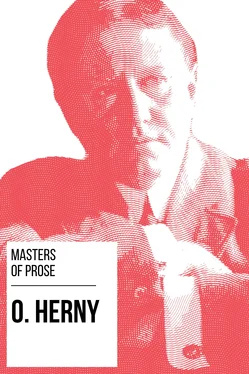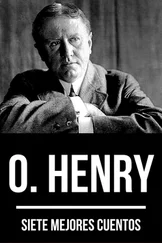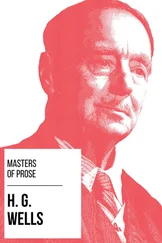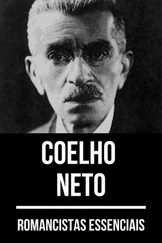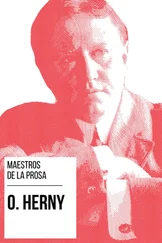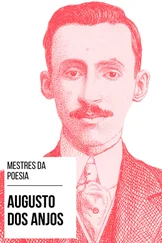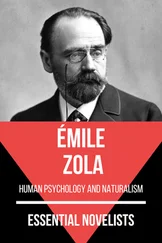At the gate a glimmer of reason in the form of sudden suspicion seized upon Jerry's beclouded mind. One or two things occurred to him. He stopped his horse, raised the trap and dropped his phonographic voice, like a lead plummet, through the aperture:
"I want to see four dollars before goin' any further on th' thrip. Have ye got th' dough?"
"Four dollars!" laughed the fare, softly, "dear me, no. I've only got a few pennies and a dime or two."
Jerry shut down the trap and slashed his oat-fed horse. The clatter of hoofs strangled but could not drown the sound of his profanity. He shouted choking and gurgling curses at the starry heavens; he cut viciously with his whip at passing vehicles; he scattered fierce and ever-changing oaths and imprecations along the streets, so that a late truck driver, crawling homeward, heard and was abashed. But he knew his recourse, and made for it at a gallop.
At the house with the green lights beside the steps he pulled up. He flung wide the cab doors and tumbled heavily to the ground.
"Come on, you," he said, roughly.
His fare came forth with the Casino dreamy smile still on her plain face. Jerry took her by the arm and led her into the police station. A gray-moustached sergeant looked keenly across the desk. He and the cabby were no strangers.
"Sargeant," began Jerry in his old raucous, martyred, thunderous tones of complaint. "I've got a fare here that—"
Jerry paused. He drew a knotted, red hand across his brow. The fog set up by McGary was beginning to clear away.
"A fare, sargeant," he continued, with a grin, "that I want to inthroduce to ye. It's me wife that I married at ould man Walsh's this avening. And a divil of a time we had, 'tis thrue. Shake hands wid th' sargeant, Norah, and we'll be off to home."
Before stepping into the cab Norah sighed profoundly.
"I've had such a nice time, Jerry," said she.
We no longer groan and heap ashes upon our heads when the flames of Tophet are mentioned. For, even the preachers have begun to tell us that God is radium, or ether or some scientific compound, and that the worst we wicked ones may expect is a chemical reaction. This is a pleasing hypothesis; but there lingers yet some of the old, goodly terror of orthodoxy.
There are but two subjects upon which one may discourse with a free imagination, and without the possibility of being controverted. You may talk of your dreams; and you may tell what you heard a parrot say. Both Morpheus and the bird are incompetent witnesses; and your listener dare not attack your recital. The baseless fabric of a vision, then, shall furnish my theme—chosen with apologies and regrets instead of the more limited field of pretty Polly's small talk.
I had a dream that was so far removed from the higher criticism that it had to do with the ancient, respectable, and lamented bar-of-judgment theory.
Gabriel had played his trump; and those of us who could not follow suit were arraigned for examination. I noticed at one side a gathering of professional bondsmen in solemn black and collars that buttoned behind; but it seemed there was some trouble about their real estate titles; and they did not appear to be getting any of us out.
A fly cop—an angel policeman—flew over to me and took me by the left wing. Near at hand was a group of very prosperous-looking spirits arraigned for judgment.
"Do you belong with that bunch?" the policeman asked.
"Who are they?" was my answer.
"Why," said he, "they are—"
But this irrelevant stuff is taking up space that the story should occupy.
Dulcie worked in a department store. She sold Hamburg edging, or stuffed peppers, or automobiles, or other little trinkets such as they keep in department stores. Of what she earned, Dulcie received six dollars per week. The remainder was credited to her and debited to somebody else's account in the ledger kept by G–––– Oh, primal energy, you say, Reverend Doctor—Well then, in the Ledger of Primal Energy.
During her first year in the store, Dulcie was paid five dollars per week. It would be instructive to know how she lived on that amount. Don't care? Very well; probably you are interested in larger amounts. Six dollars is a larger amount. I will tell you how she lived on six dollars per week.
One afternoon at six, when Dulcie was sticking her hat-pin within an eighth of an inch of her medulla oblongata, she said to her chum, Sadie—the girl that waits on you with her left side:
"Say, Sade, I made a date for dinner this evening with Piggy."
"You never did!" exclaimed Sadie admiringly. "Well, ain't you the lucky one? Piggy's an awful swell; and he always takes a girl to swell places. He took Blanche up to the Hoffman House one evening, where they have swell music, and you see a lot of swells. You'll have a swell time, Dulce."
Dulcie hurried homeward. Her eyes were shining, and her cheeks showed the delicate pink of life's—real life's—approaching dawn. It was Friday; and she had fifty cents left of her last week's wages.
The streets were filled with the rush-hour floods of people. The electric lights of Broadway were glowing—calling moths from miles, from leagues, from hundreds of leagues out of darkness around to come in and attend the singeing school. Men in accurate clothes, with faces like those carved on cherry stones by the old salts in sailors' homes, turned and stared at Dulcie as she sped, unheeding, past them. Manhattan, the night-blooming cereus, was beginning to unfold its dead-white, heavy-odoured petals.
Dulcie stopped in a store where goods were cheap and bought an imitation lace collar with her fifty cents. That money was to have been spent otherwise—fifteen cents for supper, ten cents for breakfast, ten cents for lunch. Another dime was to be added to her small store of savings; and five cents was to be squandered for licorice drops—the kind that made your cheek look like the toothache, and last as long. The licorice was an extravagance—almost a carouse—but what is life without pleasures?
Dulcie lived in a furnished room. There is this difference between a furnished room and a boarding-house. In a furnished room, other people do not know it when you go hungry.
Dulcie went up to her room—the third floor back in a West Side brownstone-front. She lit the gas. Scientists tell us that the diamond is the hardest substance known. Their mistake. Landladies know of a compound beside which the diamond is as putty. They pack it in the tips of gas-burners; and one may stand on a chair and dig at it in vain until one's fingers are pink and bruised. A hairpin will not remove it; therefore let us call it immovable.
So Dulcie lit the gas. In its one-fourth-candlepower glow we will observe the room.
Couch-bed, dresser, table, washstand, chair—of this much the landlady was guilty. The rest was Dulcie's. On the dresser were her treasures—a gilt china vase presented to her by Sadie, a calendar issued by a pickle works, a book on the divination of dreams, some rice powder in a glass dish, and a cluster of artificial cherries tied with a pink ribbon.
Against the wrinkly mirror stood pictures of General Kitchener, William Muldoon, the Duchess of Marlborough, and Benvenuto Cellini. Against one wall was a plaster of Paris plaque of an O'Callahan in a Roman helmet. Near it was a violent oleograph of a lemon-coloured child assaulting an inflammatory butterfly. This was Dulcie's final judgment in art; but it had never been upset. Her rest had never been disturbed by whispers of stolen copes; no critic had elevated his eyebrows at her infantile entomologist.
Piggy was to call for her at seven. While she swiftly makes ready, let us discreetly face the other way and gossip.
For the room, Dulcie paid two dollars per week. On week-days her breakfast cost ten cents; she made coffee and cooked an egg over the gaslight while she was dressing. On Sunday mornings she feasted royally on veal chops and pineapple fritters at "Billy's" restaurant, at a cost of twenty-five cents—and tipped the waitress ten cents. New York presents so many temptations for one to run into extravagance. She had her lunches in the department-store restaurant at a cost of sixty cents for the week; dinners were $1.05. The evening papers—show me a New Yorker going without his daily paper!—came to six cents; and two Sunday papers—one for the personal column and the other to read—were ten cents. The total amounts to $4.76. Now, one has to buy clothes, and—
Читать дальше
